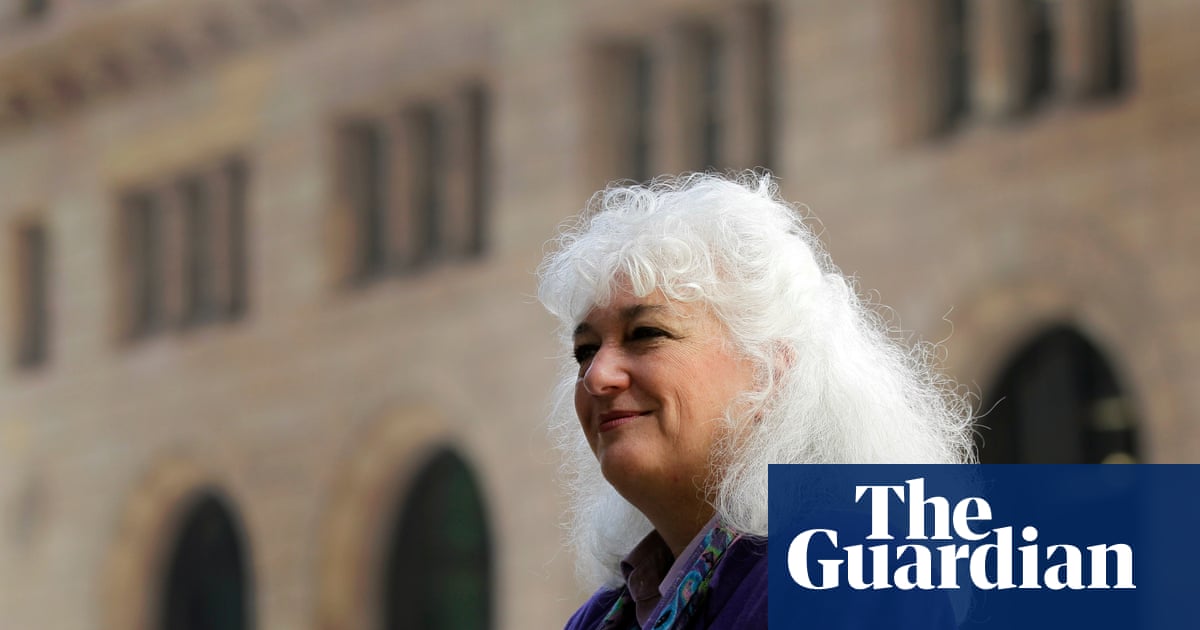Inside a packed banquet hall in northern California in early August, tensions were flaring. As the representative Doug LaMalfa spoke to constituents in his district, he faced immediate pushback from frustrated audience members who shouted the Republican down.
It was the first public town hall LaMalfa had held in Chico, the largest city in his district, in eight years. The booing and shouts grew louder still as the Republican representative, a loyal supporter of Donald Trump, talked about “waste and fraud” in government programs, and the uproar continued for more than an hour as people expressed fear and anger over immigration raids, tariffs, cuts to Medicaid and Medicare and the impacts on rural hospitals. Some called for his resignation, while one attendee yelled: “No fascism in America.” The rowdy scene made headlines across the US.
It came before a crucial moment for the representative – just days later, California’s governor announced plans to move forward with a proposal to redraw the state’s voting map in an effort to create five new Democratic seats in the US House of Representatives. The redistricting plan is a direct response to gerrymandered maps in Texas. Now voters will decide on the proposal in a special election in November. If the proposition is approved, LaMalfa, a seven-term representative, could lose his seat in the war over control of the House.
With less than six weeks before the election, the fight is on in the first congressional district, which covers a vast swath of northern California from the almond orchards and rice fields of the Sacramento valley to the forested and fire-prone foothills of the Sierra Nevada and Cascades. Audrey Denney, a previous Democratic challenger who came closer than any prior candidate to unseating LaMalfa, has said she will run again if Proposition 50 passes. LaMalfa, meanwhile, “is committed to running in his current district and ensuring that Proposition 50 fails”, his office said in a statement.
Democratic and Republican groups alike are preparing for a contest that could dramatically reshape the area’s political representation and ultimately determine the US president’s ability to advance legislation after the midterm elections.
“Overwhelmingly, the reason people care is the belief that the Democrats [winning] control of the House of Representatives next year is the only possible meaningful impediment to Donald Trump’s implementation of his authoritarian agenda,” said David Welch with the Democratic central committee of Butte county, where Chico is located.
Conservatives in this area argue that Prop 50 represents an existential threat that will erode the already limited Republican representation in the state.
“We already only have nine seats throughout the entire state of California on the Republican side and we could go down to four seats if 50 passes. It’s not a fair representation for the parties – it’s not fair for both sides,” said Teri DuBose, the chair of the Butte county Republican party, who also works for LaMalfa’s office. “The voters should be picking their representatives, not the representatives picking their constituents.”
Residents of this part of northern California, with its remote mountain communities, frequent wildfires and vast agricultural industry, often say it’s different from the more densely populated areas of the state.
“We’re very rural here,” DuBose said. “As I drive from Chico to Orland right now, all I see are almond trees and open fields and walnuts and tractors. We don’t have the big-city high-rises and freeways with traffic.”
The first congressional district is among the most conservative, and whitest, in the state.
Water, wildfires, housing and homelessness have been key issues for voters in recent years. The area was already struggling with a severe housing shortage when several years of large wildfires destroyed thousands of homes, worsening the crisis and pushing more people onto the streets.
Over the last decade, wildfires have scorched nearly 40% of land in the county, including the 2018 Camp fire, which destroyed the community of Paradise and killed 85 people, 2020’s North Complex fire, which wiped out Berry Creek and left 16 people dead and last year’s Park fire, one of the largest blazes in state history.
While there was a strong base of Democratic supporters in the region in the mid-20th century, much of what is now California’s first congressional district has largely voted Republican since the 1980s. Trump has consistently carried the area since 2016 and in 2024 received 61% of the vote.
Butte county, where LaMalfa is from, is more evenly politically split due to the more liberal community of Chico, a university town, and the more conservative agricultural areas – in 2008, it supported Barack Obama, in 2020 backed Joe Biden, but in 2016 and 2024 went for Trump.
LaMalfa, a rice farmer who previously served as a state lawmaker, has represented the district since 2013. In an interview this year with the Chico Enterprise-Record, he cited the work his staffers have done assisting people having issues with social security, Medicaid and Veterans Affairs as his proudest accomplishments in office.
“It’s defending these folks and giving them a level of hope that somebody is actually listening to them,” he said.
He’s garnered attention – and criticism – in recent years as an ally of the president who challenged the 2020 election outcome and voted against certifying the result and has expressed skepticism about the climate crisis and its cause. Efforts to unseat LaMalfa have been unsuccessful, but the 2018 and 2020 elections revealed some level of discontent.
“He does not at all differ from Trump’s line-by-line mandate of what he says Republicans should say,” Denney said, adding that LaMalfa has introduced “anti-LGBTQ, anti-public health” legislation that “harms our communities”.
In the 2018 race, Denney, an educator and consultant with a background in agriculture, pledged to represent working families in the district. She closed the representative’s more than 30-point lead in the primary down to 9.5%, and raised $1m, but LaMalfa ultimately prevailed, and did so again in 2020.
“At the end of that election, I was feeling pretty defeated. And then when they redrew the maps in 2022, it was just clear to me that it was not a winnable district,” she said.
But this year, frustrations in some corners of the district have continued to mount over the Trump budget, which is expected to have a significant impact on rural areas and hospitals with its cuts to Medicaid and new work requirements for food stamps. That anger was on full display at LaMalfa’s town hall.
LaMalfa did not agree to be interviewed, but in a statement, Paige Boogaard, his communication director, said the representative had anticipated as much but stated that most constituents back Trump’s agenda.
“Congressman LaMalfa purposefully chose highly contentious areas of his district so that they feel heard. Their reactions were completely expected,” she said. “Raucous townhalls in Chico do not change the fact that District 1 and Northern California remain overwhelmingly conservative and overwhelmingly supportive of both Congressman LaMalfa’s and the President’s policies.”
Meanwhile, the area is already grappling with the loss of one rural hospital. Glenn medical center will close its emergency room in just a few days, leaving Glenn county without a hospital, after the federal government moved to eliminate its “critical access” designation. The representative “continues to work on issues related to Glenn Medical Center and rural healthcare”, Boogaard said.
‘Not a fair representation for the parties’
Ten days after the town hall, Gavin Newsom announced California would move ahead with a plan to put a redistricting proposal before voters. The governor described it as “neutralizing” Texas’s new maps that could flip up to five seats. The referendum would temporarily suspend the use of maps from California’s independent redistricting commission and instead use legislatively drawn maps until after the 2030 census. The special election could cost as much as $282m.
LaMalfa has sharply criticized the effort.
“No state should be doing mid-decade redistricting unless directed by a court or forced to. Voters in California have voted overwhelmingly twice to prevent partisan redistricting,” he said in a statement at the time. “I will fight to make sure Northern California is represented by someone they elect, not someone Sacramento Democrats selected in a back room.”
Under the new map, Butte county and much of district 1 would be joined with counties further to the west and south, including Sonoma county. Democrats have praised the proposal, not just for what it will mean locally, but to the country.
“I think Governor Newsom doing Prop 50 has got Democrats all across America saying to themselves: ‘Hey, we got a chance to retake the House to defeat Trump,” said Bob Mulholland, a veteran Democratic strategist and Butte county resident.
Denney argued it was a necessary course of action for the current political era in which the Trump administration is “tearing down institutions and norms”.
“In this moment of time that we’re living in, with the scope and the scale of the threat that we’re up against, I think it’s absolutely the right move,” she said.
“I love the new district. I love how it combines the two college towns on each end, Santa Rosa and Chico. Both have been historically devastated by wildfires, both surrounded by agriculture,” she said, adding that it will bring together areas where natural resources and land management are of deep concern.
Republican and Democratic chapters across the district are working to rally voters before the November election, spreading signs far and wide and door-knocking. In Denney’s Chico home earlier this month, she had boxes with thousands of pieces of pro Prop 50 literature.
Further south, in Yuba county, the local Republican party has purchased 10,000 yard signs to spread across the state, said Johanna Lassaga, the county party chair.
“I think [Prop 50] would be devastating to our area. Putting the urban areas with the rural areas, we don’t get that fair representation,” she said.
West of Chico, in the farmlands of Glenn county, Lee McCorkle, the local Republican party chair, has also been posting signs far and wide. He argued LaMalfa has been a valuable representative, citing his role in securing federal money to build a reservoir and nearby levee.
“Doug, he’s a conservative guy, he’s a rice farmer, he spends a lot of time to be a congressman,” McCorkle said. “It’s a heck of a job. I wouldn’t want it.”
Texas shouldn’t have moved ahead with their new congressional maps, DuBose said, but she argued what’s happening in California is also wrong. People are frustrated the state is moving forward with a costly special election, she said, when the governor did not fully fund Prop 36, a measure approved by voters last year that implements harsher penalties for theft and drug offenses. (Newsom’s budget did not initially include funding for that proposition, which he said was a result of shortfalls, but he later approved $100m to support the legislation.)
And the speed at which the proposition has moved ahead has forced the party to quickly jump into gear, she said.
“We really kind of got blindsided. It didn’t give us much time, so we just went all out [with the campaign],” she said. “Every moment that I’m not working, I am doing this.”
In a historically conservative district, the local Democratic party has relatively few resources, said Welch with the Butte county Democrats, but they too are doing “everything we can to mobilize and motivate people”.
“It’s almost certain the spending [to] defeat this will be enormous,” he said. “Really our best hope of overcoming that is with motivating individuals to volunteer to work at a grassroots level.”
For her part, Denney, who also chairs the Democratic Action Club of Chico, has been traveling to the far reaches of the district in north-eastern California to talk to voters about Prop 50.
“Even up to a month ago, I had zero belief that anything would ever change,” she said. “It’s gonna have a different ending this time.”

 German (DE)
German (DE)  English (US)
English (US)  Spanish (ES)
Spanish (ES)  French (FR)
French (FR)  Hindi (IN)
Hindi (IN)  Italian (IT)
Italian (IT)  Russian (RU)
Russian (RU)  2 hours ago
2 hours ago
























Comments